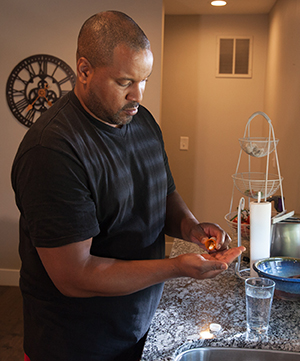Diabetes and Heart Disease
If you have diabetes, you're twice as likely to have heart disease or a stroke than someone without diabetes. You may also get heart disease at a younger age. This higher risk is because of diabetes. But it's also due to related risk factors for heart disease that happen with diabetes. The good news? You can reduce your risk for heart disease. This can happen with a healthy diet, exercise, and diabetes management.
Your main risk factors
The 3 major risk factors for heart disease are high blood sugar, high blood pressure, and high levels of fat in the blood (lipids). By controlling these things, you can help keep your heart and arteries healthy. This may reduce your risk of heart disease.
-
Blood sugar. High blood sugar can make artery walls tough and rough. Plaque is waxy material in the blood. It can then build up along the artery walls. This makes it harder for blood to flow through the arteries. High blood sugar also raises the chances of having high blood pressure and high cholesterol.
-
Blood pressure. When blood pressure is high all the time, it causes your heart to work harder to pump blood. Artery walls become damaged. This makes it more likely for plaque to build up.
-
Lipids. Your body needs some blood fats (lipids) to stay healthy. But lipid levels that are too high can harm artery walls. Lipids include cholesterol and triglycerides. There are 2 kinds of cholesterol. LDL (bad) cholesterol can damage the arteries. But HDL (good) cholesterol helps clear LDL from the blood vessels. This helps keep the arteries healthy. When blood sugar is high, the level of triglycerides in the blood may also be high. This can also cause plaque to form.
Other risk factors
Certain lifestyle factors can raise levels of your blood sugar, blood pressure, and lipids. Higher levels raise your risk for heart disease:
-
Smoking. Smoking damages the lining of your arteries. This allows plaque to build up in the artery walls. It also narrows the arteries. This can raise blood pressure and cause chest pain (angina). Smoking also raises your risk of getting type 2 diabetes. Also don't use e-cigarette, or vaping, products.
-
Not being active. Not being active makes it harder for your heart to do its work. Inactivity is linked to many other problems, such as high blood pressure and high cholesterol levels. Inactivity also increases your risk of getting type 2 diabetes.
-
Being overweight. Being overweight makes it harder for your body to use insulin. It also makes your heart work too hard. Being overweight is also 1 of the main risk factors leading to type 2 diabetes.
Changes you can make
 |
| Take your medicines as directed each day, even if you feel fine. |
The simple steps below can help keep your risk factors under control. Work with your healthcare team to reach your goals.
-
Quit smoking. Quitting smoking could save your life. Smoking harms the lining of the blood vessels. It raises blood pressure. It also affects how your body uses insulin. This makes it harder to keep blood sugar under control. If you smoke and need help quitting, talk with your healthcare team.
-
Test your blood sugar. Checking your blood sugar is the only way to know if it's under control. Test your blood sugar yourself. Use a blood glucose meter or a continuous glucose monitor. Also get tested in the lab, as directed.
-
Check your blood pressure and lipids. Keeping track of your blood pressure and lipid levels is key. This can help you stay at safe levels. Visit your healthcare team as scheduled.
-
Take medicines as directed. This can help control blood sugar, blood pressure, blood clotting, and cholesterol levels. Several medicines for diabetes may also lower your risk for heart attacks and strokes.
-
Eat healthy. Eating healthy foods can cut your risk factors and help you lose weight. Try to limit the amount of processed or refined carbohydrates you eat at one time. Cut back on your total calories. Eat foods low in saturated fat and cholesterol. Eat fiber, including vegetables and whole grains. And cut down on salt. A dietitian or diabetes educator can help make a meal plan that works for you—even if you're on a limited budget. Ask your dietitian about the Diabetes Plate Method. This method is recommended by the American Diabetes Association.
-
Limit alcohol. Drinking alcohol even in low or moderate amounts can be harmful. It can increase your body's sensitivity to insulin. But it also places you at greater risk for low blood sugar reactions.
-
Be active. Physical exercise can help reduce your weight and strengthen your heart. It can also lower your lipid levels and blood pressure. Exercise and activity are good for your whole body. Talk to your healthcare team about increasing your activity safely over time.
-
Keep your appointments. Regular visits with your healthcare provider help you stay healthy. Go in for checkups and lab tests as scheduled.
Online Medical Reviewer:
Michael Dansinger MD
Online Medical Reviewer:
Raymond Kent Turley BSN MSN RN
Online Medical Reviewer:
Rita Sather RN
Date Last Reviewed:
8/1/2023
© 2000-2024 The StayWell Company, LLC. All rights reserved. This information is not intended as a substitute for professional medical care. Always follow your healthcare professional's instructions.